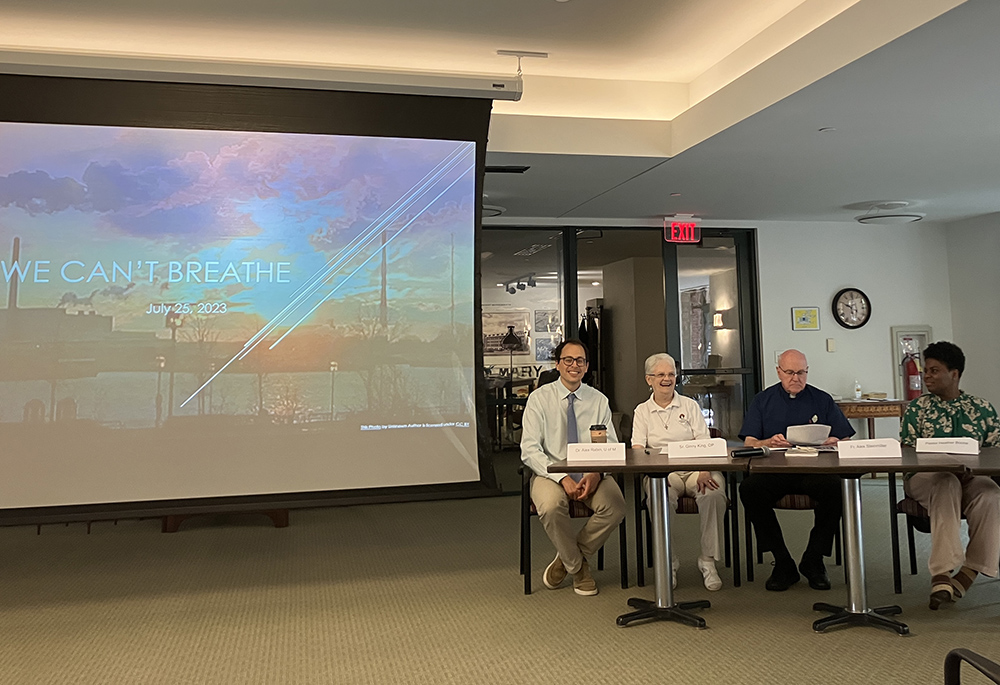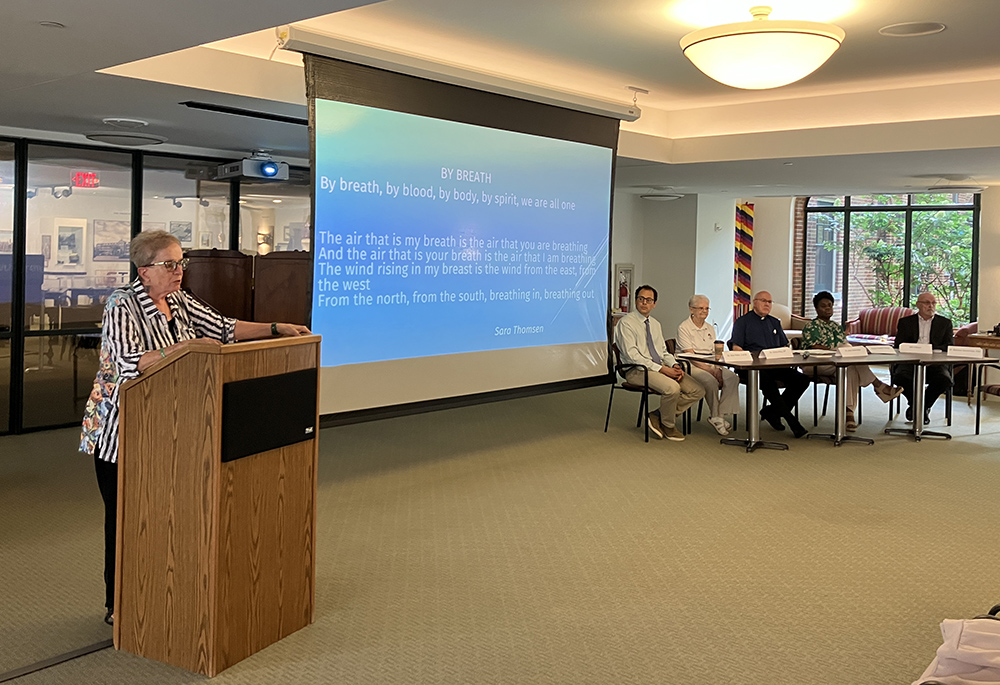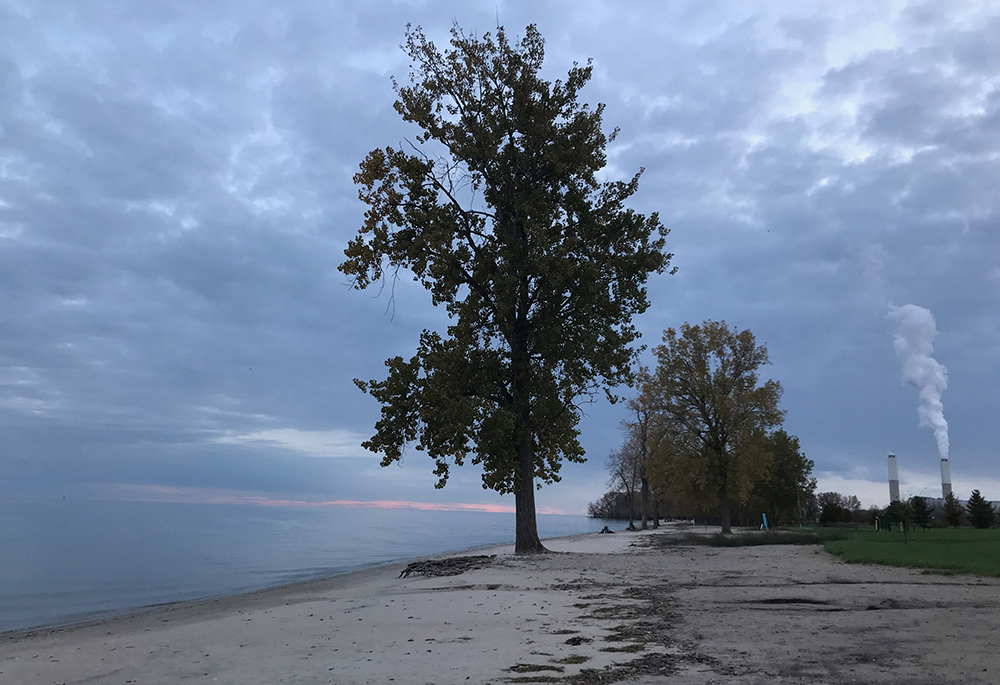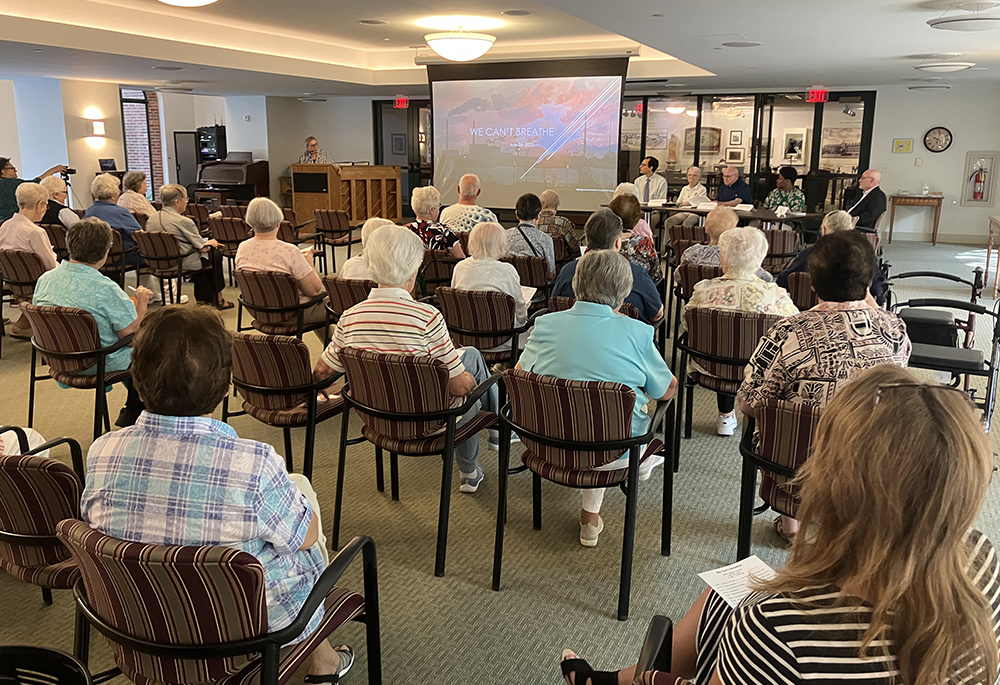
"We Can't Breathe" panelists address about 45 attendees at the Sisters, Servants of the Immaculate Heart of Mary motherhouse, July 25 in Monroe, Michigan. Pictured, left to right, are Alexander Rabin, Adrian Dominican Sr. Virginia (Ginny) King, Passionist Fr. Alex Steinmiller and Heather Boone, pastor of Oaks of Righteousness Christian Church. (Amy Ketner)
On yet another smoky day in Monroe, Michigan, a panel of Catholic religious, a Christian pastor and a University of Michigan pulmonary clinician stressed the pressing need for proposed changes to national greenhouse gas standards.
The event, "We Can't Breathe," was held July 25 at the Sisters, Servants of the Immaculate Heart of Mary (or IHM) motherhouse, less than five miles from the DTE Monroe Power Plant, one of the nation's top emitters of greenhouse gases. Panelists discussed air pollution's dangerous — even deadly — health effects, and our urgent moral call to action.
Event attendees were encouraged to write comments on postcards to be sent to the United States Environmental Protections Agency, or EPA, in support of the proposed changes. Panel host IHM Sr. Barbara Stanbridge said, "We want to encourage the EPA to truly be an environmental protection agency … not [one] protecting the fossil fuel industry."
"We Can't Breathe" was the second Detroit-area event of its kind organized this year by In Solidarity, a national organization that brings Catholic social teaching to the public sphere.

IHM Sr. Barbara Stanbridge welcomes event attendees and leads an opening prayer with a song called "By Breath" by Sara Thomsen. (Amy Ketner)
In May, while Canada was fighting unseasonable wildfires, the EPA proposed emission limits and guidelines for carbon dioxide from fossil fuel-fired power plants. After transportation, the power sector was the next largest source of greenhouse gases in the United States in 2021. The EPA's proposed limits target these emissions, which according to the EPA are "almost entirely" due to fossil fuel combustion in electric generating units.
For faith leaders on Tuesday's panel, the burning of fossil fuels holds deep moral implications that require action.
Adrian Dominican Sr. Virginia (Ginny) King said, in the church, religious women have led the way on environmental issues, stating that the Leadership Conference of Women Religious, or LCWR, has long supported limits on carbon pollution for power plants. She said her religious community has "worked hard to love earth as a gift from God," reducing electricity use on their campus by 28%. She expressed her community's appreciation for partnering with the IHMs in environmental advocacy, noting that women from both communities have served as LCWR presidents.
The very building in which the event took place, the IHM motherhouse, is one of the Midwest's largest residential sustainable renovations and has won awards from the EPA. Stanbridge said her community has a long relationship with DTE Energy and frequently puts pressure on the corporation, which operates the Monroe Power Plant and the Enrico Fermi Nuclear Generating Station, both in close proximity.

DTE Energy's coal-fired Monroe Power Plant, operating on the shores of Lake Erie, is scheduled to retire in 2032. It is viewed here from Sterling State Park, in Monroe, Michigan, in November 2021. (Amy Ketner)
Event panelist and Passionist Fr. Alex Steinmiller serves on his order's national Laudato Si' commission. This week, Steinmiller celebrates 60 years since his vows "to live simply, to pay attention, and to promote devotion to the passion of Jesus Christ," he said, adding, "In all of our chapels, Jesus is on the cross and his eyes are wide open … his sufferings continue even to today."
Quoting Pope Francis in his 2015 encyclical "Laudato Si', on Care for Our Common Home," Steinmiller said "Pollution is a moral issue, 'a sin against ourselves and a sin against God.' … When something is a moral issue, we are called to action." He reminded the public of the pope's urgent call to develop policies to significantly reduce the emission of polluting gases.
"Our Catholic conference of bishops has advocated this for years, to reduce carbon dioxide. Do you ever hear this in homilies? We're talking about sin," said Steinmiller. "We emphasize sins against sex, what about sins against our environment?" He encouraged the audience to ask their pastors to preach about environmental issues, and to get involved.
The EPA's proposed changes would save lives, preventing about 1,300 premature deaths and over 300,000 asthma attacks. Alexander Rabin, a clinical assistant professor of pulmonary and critical care medicine at the University of Michigan, underscored these numbers at the event, noting that day's high air quality index and hazy skies.
He used the example of recent wildfire smoke to highlight the medical effects of air pollution. "The larger particles attack our nose and mouth while the tiniest particles … enter into our bloodstream," which, he said, can provoke heart attacks, asthma and anxiety.
Advertisement
"All of these health problems stem from the burning of fossil fuels that are directly driving climate change and the extreme heat," Rabin told EarthBeat, naming climate change as "the biggest threat to our health."
Rabin is deeply concerned, especially for those who are historically disadvantaged and live near power plants and busy roads, without the ability to get away or filter their air. Systemic racism plays a role, he said to the panel. "Everyone is harmed by toxins in our lungs … but not everyone is equally harmed."
Co-panelist Heather Boone, pastor of Oaks of Righteousness Christian Church in Monroe, witnesses this reality in the free day care center at her church. There, children have not played outside amid the wildfire smoke because most have asthma. "Why do most of the kids have asthma? Because they are low-income children, a lot of them are Black, and they're living right by the DTE plant. So, we are seeing the effects every single day," Boone said to the audience. According to Rabin, Black children are 34% more likely to experience asthma exacerbations from results of climate change.
Boone likened the social attitude about climate change to that of King Hezekiah in 2 Kings. We think it affects "those people on that side of town," Boone said. "Well, I'm one of those people on that side of town, and I'm saying we've got to do something."
Boone applauded the IHM sisters in Monroe for their action. "They're not afraid to speak up. They truly understand the cause of caring for the least of these," she told EarthBeat. However, she said, "collectively, the church as a whole could do more. But not just the Catholic Church. All churches need to … do better caring for what God has blessed us with."

IHM Sr. Barbara Stanbridge addresses an audience of about 45 religious women and local community members at "We Can't Breathe," held July 25 at the IHM motherhouse in Monroe, Michigan. (Amy Ketner)
Rabin said many of his medical colleagues are hesitant to speak up, as the issue could be viewed as political. "I don't really care if it's political because it's the truth and we're all seeing it, we're breathing it." Rabin, whose op-ed on pollution was recently published in The New York Times, said his job as a physician "is to speak the truth." That's why he participates in Michigan Clinicians for Climate Action, which connected him with the IHM sisters and In Solidarity.
Rabin believes leaders in the faith and medical communities need to work together because they complement each other in their advocacy, with one providing emotional and moral grounding, the other, scientific data and facts.
"The faster we can get away from these sources of dirty energy generation, the better we'll all be," Rabin told EarthBeat.
Though Tuesday's event ended on a hopeful note, panelists remained cautious and urged attendees to take action quickly, as the EPA comment period closes on Aug. 8.
"We have seen the EPA shrink back on other air pollution matters," King said. "We're urging them to stay strong in the face of the pressure campaign from the fossil fuel industry."
"We need to exercise our prophetic voice," said Stanbridge.





